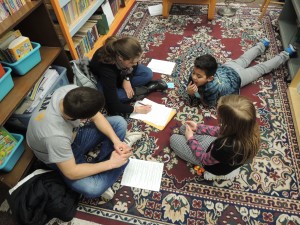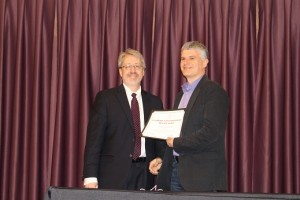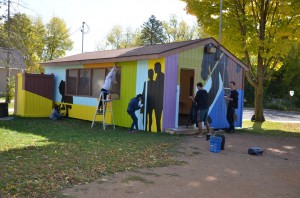Benefits for Students

-
ACE is a high-impact practice.
The Association of American Colleges and Universities (AAC&U) has defined “service-learning, community-based learning” as a high-impact educational practice.
- In the report, “High Impact Educational Practices: What They Are, Who Has Access to Them, and Why They Matter,” by George D. Kuh (AAC&U, 2008) presented the case for adopting these pedagogical strategies. Read an overview of this report on the AAC&U website.
- Evidence and other Eight-Letter Words: Musings from the National Evaluator (link) – This article by the national evaluator for AAC&U’s Bringing Theory to Practice grant program reports on the link between learning, civic engagement and student well-being that is associated with “high impact practices.”
-
ACE can help with student success because it offers different ways of learning and demonstrating knowledge.
- Student Success and Student Engagement: Leveraging Multiple Degrees of Achievement (link) – This article describes the benefits to student academic success that have been demonstrated by thoughtful incorporation of civic engagement into curricular activities.
- Community as a resource for learning (pdf) – This paper “reviews ‘academic service learning’, i.e. experiential learning that takes place in the community as an integral part of the curriculum.” Written by Andrew Furco, University of Minnesota Associate Vice President for Public Engagement.
- Research shows that “students who participate in service-learning are more likely to go to college, stay in college, and succeed academically,” according to Campus Compact’s report, “A Promising Connection: Increasing College Access and Success through Civic Engagement.”
- “Carleton, St. Olaf, St. Scholastica, and University of Minnesota Duluth students who took STEM service-learning courses supported by a Learn and Serve America grant available through Minnesota Campus Compact showed significantly increased interest in studying STEM fields—from an average of 6.22 to 9.24 on a 10-point scale—and 85% agreed that the use of service-learning enhanced their understanding of the scientific content.” – Source: Minnesota Campus Compact
-
ACE advances real-world skills that employers value.
- A nation-wide survey of business leaders in 2008 sponsored by AAC&U showed that internships or community-based experiences are the best indicators of student’s job readiness.
“When it comes to the assessment practices that employers trust to indicate a graduate’s level of knowledge and potential to succeed in the job world, employers dismiss tests of general content knowledge in favor of assessments of real-world and applied-learning approaches…. assessments that employers hold in high regard include evaluations of supervised internships, community-based projects, and comprehensive senior projects.” – AAC&U report, How Should Colleges Assess and Improve Student Learning?
- In AAC&U’s 2015 Employer and Student Survey, “Falling Short? College Learning and Career Success,” conducted by Hart Research Associates, 80% of employers deem the ability to apply knowledge and skills to real-world settings as very important (4) and “fully 60% of employers think that ALL college students should be expected to complete a significant applied learning project before they graduate” (6).
- A nation-wide survey of business leaders in 2008 sponsored by AAC&U showed that internships or community-based experiences are the best indicators of student’s job readiness.
Benefits for Faculty

- Lead to new publishing—research on ACE teaching and learning and/or research with a community partner
- Engage students with different learning styles
- Attract highly motivated and engaged students
- Advance institutional learning outcomes and/or disciplinary expectations and values
- Access more networking opportunities with engaged faculty in other disciplines or institutions
- Personal meaning and fulfillment as civic professionals, such as outlined in Amy Koritz and Paul Schadewald’s article in Peer Review, “Be the Change: Academics as Civic Professionals“
Benefits for the Community

The “community” can range from a geographic community (Northfield, Rice County, MN, the US, or an international community), an identity-based community (race/ethnicity, religion, gender, etc.), or a general idea of “for the public good.”
Most of the time, ACE involves work with local community partners, but can absolutely involve partners further afield and across various identities. While more work needs to be done to document impacts on the Northfield community of academic civic engagement, the benefits to our local community is evidenced by the interest and enthusiasm expressed by community partners in working with St. Olaf students, and by the long-term nature of many partnerships. The benefits are also shown by the number of courses and students in those courses that have engaged with the community. These numbers only scratch the surface of all civic engagement activities by St. Olaf students and faculty given the many other curricular and co-curricular community engagement opportunities that exist on-campus (internships, community-based work study, undergraduate research, volunteering, etc.).
You must be logged in to post a comment.